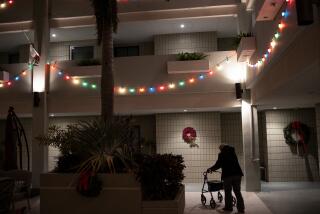BOOK REVIEW : Why the City Mouse Is More Uptight Than the Country Mouse : THE POWER OF PLACE: How Our Surroundings Shape Our Thoughts, Emotions and Actions, <i> by Winifred Gallagher,</i> Poseidon Press, $22, 233 pages
To some of us who are exhausted by the daily scrimmage of city life, nature seems little more than somewhere to take the kids on weekends. Truth be told, though, argues popular psychology writer Winifred Gallagher, we need nature more profoundly than many of us realize.
Our innate love of nature--what Harvard biologist E.O. Wilson calls “biophilia”--may stem from our evolutionary past. Researchers have found that all people, from American city dwellers to villagers in the hinterlands of Bali, when asked to rate the attractiveness of various photographed landscapes, choose open, grassy plains with bodies of water and broad, low-branching trees--characteristics of the African Savannah, where most experts now believe the human race was born.
Nevertheless, most of us live out our lives in exile from that Garden of Eden--to our great psychological cost, Gallagher says. In her first book, “The Power of Place,” she offers an amusingly written if superficial answer to the perennial question, “If we know so much, why aren’t we happy?”
The short answer to the question is that our technology-assisted escape from extreme environments has broken our bond with the Earth. For Gallagher, we citizens of the developed world are paying the price of our artificial comforts in unprecedented mental, physical and social disintegration.
Gallagher offers no way out of this mess, apart from recommending bright lights for depressives and a house in the country for everyone. Instead, she trots out a string of widely disparate psychological studies of human well-being, or the lack of it, and adds interviews with researchers in cognitive science.
From these sources, the reader gathers a few minor insights, such as that some mood disorders depend inversely on the amount of sun one gets, and that shy people suffer more from hay fever than do extroverted people.
But most of Gallagher’s discoveries are not likely to stop the presses. For example, studies show that old people would rather watch other people getting on and off an elevator than sit alone in a room; and Alaskans who stay indoors during the winter suffer cabin fever more than those who go outside to hunt, fish and run their dogs.
Gallagher’s cliches notwithstanding, retreats have for ages offered people spiritual renewal, and pop anthropologists such as Joseph Campbell and Carlos Castaneda, not to mention many more scholarly investigators, have written extensively on the subject. But Gallagher ignores them all. Instead, for an entire chapter titled “Sacred Places,” she celebrates an obscure Canadian psychologist who wires up undergraduate students’ heads, then uses a magnetic field (the same sort of field, incidentally, that Gallagher decries elsewhere in her predictable screed against electric power lines) to induce mystical experiences in his subjects.
Perhaps because he has been unable to snare enough ordinary volunteers, this psychologist also studies people who claim to have been abducted by aliens. He reports to Gallagher that the abductees’ claims that “spacemen did tests on my genitals” can be simply explained by the action of electromagnetic fields, induced by tectonic movements in the Earth’s crust, on the victims’ gonadal tissue.
Gallagher passes such hogwash on enthusiastically and without reflection. Although the author reports on mainstream as well as fringe research, many readers may not know the difference.
A more serious shortcoming of the book is that the author fails to convey the criticism from peers that is essential to scientific inquiry. She prefers to reverentially and interminably quote her scientists--major and minor figures alike--without permitting the slightest murmur of dissent from a knowledgeable colleague.
If you’re thinking about buying a country home, don’t look to these pages for a reason.
More to Read
Sign up for our Book Club newsletter
Get the latest news, events and more from the Los Angeles Times Book Club, and help us get L.A. reading and talking.
You may occasionally receive promotional content from the Los Angeles Times.





